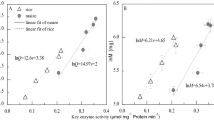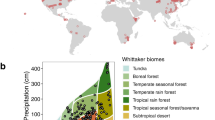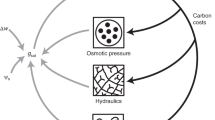Abstract
IN the growing plant, where the photosynthetic tissues make the major contribution to dry-matter production, the absolute growth rate at any time is the product of the rate of increase in weight per unit of leaf (net assimilation rate1, N.A.R.) and the amount of leaf present. The latter is usually expressed in terms of leaf area, which is the product of leaf weight and the area-to-weight ratio.
This is a preview of subscription content, access via your institution
Access options
Subscribe to this journal
Receive 51 print issues and online access
$199.00 per year
only $3.90 per issue
Buy this article
- Purchase on SpringerLink
- Instant access to full article PDF
Prices may be subject to local taxes which are calculated during checkout
Similar content being viewed by others
References
Gregory, F. G., Ann. Bot., 40, 1 (1926).
Blackman, V. H., Ann. Bot., 33, 353 (1919).
Crowther, F. C., Ann. Bot., 48, 877 (1934).
Heath, O. V. S., Ann. Bot., N.S., 1, 565 (1937).
Rees, A. R., Nature, 197, 63 (1963).
Author information
Authors and Affiliations
Rights and permissions
About this article
Cite this article
JACKSON, J. Relationship of Relative Leaf Growth Rate to Net Assimilation Rate and its Relevance to the Physiological Analysis of Plant Yield. Nature 200, 909 (1963). https://doi.org/10.1038/200909a0
Issue Date:
DOI: https://doi.org/10.1038/200909a0



